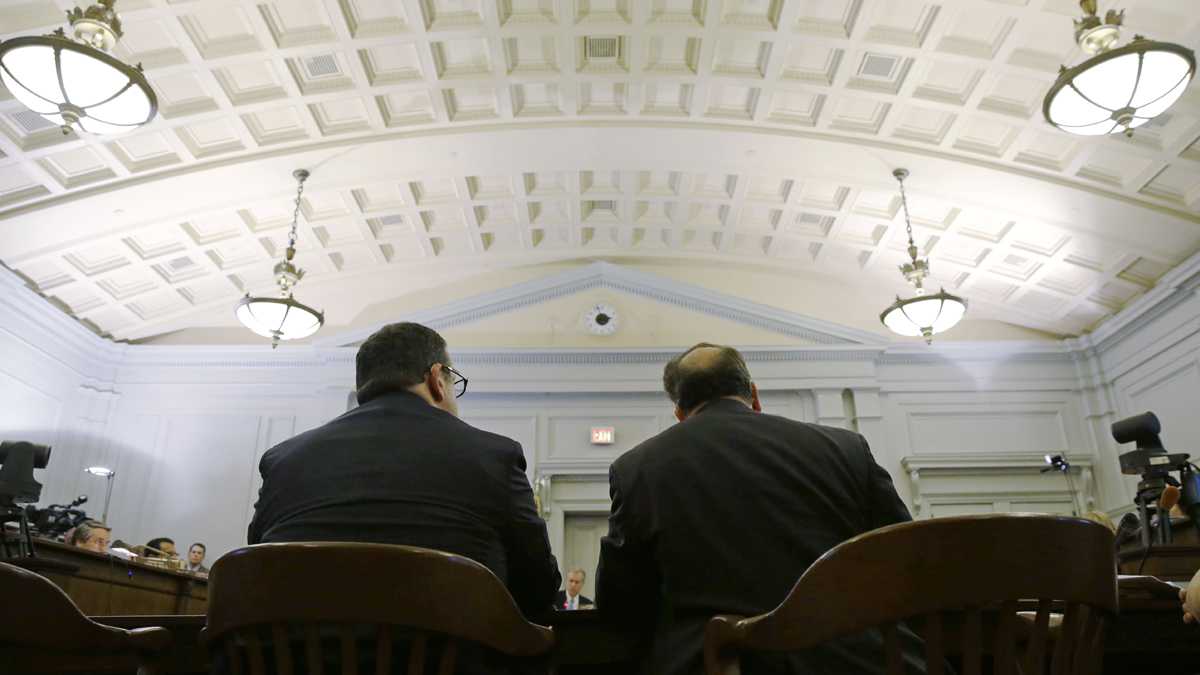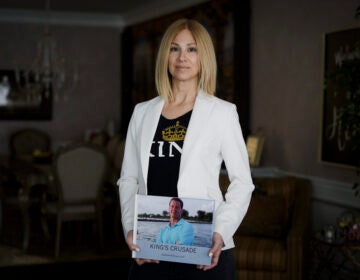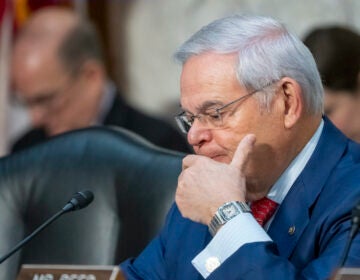Commentary: Why ‘Bridgegate’ remains a problem for Chris Christie’s campaign

David Wildstein, left, looks on during a Bridgegate hearing on Jan. 9, 2014, at the Statehouse in Trenton. (Mel Evans/AP Photo, file)
It took a while, but the Bridgegate scandal is now a part of the 2016 contest for the Republican presidential nomination. The dilemma facing Gov. Chris Christie: Fight back ferociously and publicly over allegations that he was aware of the lane-closing scheme at the George Washington Bridge or shrug it off with a quick quip and hope no one pursues it.
Not surprisingly, the cannonball across Christie’s bow was launched by Donald Trump, who expressed his view that Christie knew of the lane-closing plot and, because of that and other “things in his past,” was unelectable.
Uncharacteristically, Christie’s response to Trump was rather mild and, more recently, he casually dismissed the comments by the front-running billionaire with a “boys will be boys” and “The Donald will be The Donald” reaction.
Christie’s refusal to return fire became a story in itself, producing broad speculation that it was a part of the governor’s strategy to avoid a direct and potentially ugly confrontation that could offend Trump’s supporters. If Trump’s candidacy eventually runs out of steam, the theory goes, his supporters could turn to Christie. More prudent to stay on their good side and make a pitch to them rather than irritate them and send them off to back someone else.
While there is a certain logic to the strategy of possible support shifting from Trump, Bridgegate is Christie’s kryptonite. To touch it weakens him and his campaign. To engage Trump in a rhetorical nuclear exchange is a genuine risk.
Despite no evidence to support it, there exists a persistent undercurrent of suspicion that Christie knew of the lane-closure scheme before it was set in motion or that he became aware of it once the cover story — that it was a traffic study — began to unravel.
The kind of response normally expected from Christie — “sit down and shut up,” for instance — would immediately drive Bridgegate to a position of prominence in the campaign, a development that would not serve the governor well.
If, for instance, Trump ratcheted up his criticism and began flinging allegations around that Christie knew of the involvement of one of his deputy chiefs of staff and two of his appointees to the Port Authority of New York and New Jersey, the governor would be obliged to respond in a more forceful and detailed manner.
Trump has demonstrated his love of outrage and willingness to drop the hammer on anyone or any group whenever the mood strikes him. From describing Mexicans as drug dealers and rapists to charging that Muslims in New Jersey cheered the terrorist attacks of September 11, 2001, he’s shown he’s not afraid to create a political uproar to advance his agenda. Bridgegate is perfectly suited to Trump’s style.
Christie has steadfastly maintained that he knew nothing of the lane-closing scheme and accepted the explanation that it was part of a Port Authority-sanctioned traffic study.
The discovery of an e-mail — “Time for some traffic troubles in Fort Lee” — from Bridget Anne Kelly, his deputy chief of staff, revealed that the traffic study was a cover story to disguise political payback to punish the mayor of Fort Lee for refusing to endorse Christie’s 2013 reelection.
The governor’s insistence that he’s been exonerated by the United States Attorney is something of an overreach since the investigation remains active. The investigation by a law firm retained by the administration cleared the governor of any involvement, but that report has been largely dismissed as a considerably less than credible effort whose conclusions were bought and paid for before the first witness was interviewed.
It is precisely because of the unsettled nature of the scandal that Trump — should he choose to — can drive a narrative that Christie does not have totally clean hands.
While he is more often than not short on details, Trump is never at a loss for colorful rhetoric, the sort the media salivates over.
His pursuing Christie over Bridgegate would create a seriously uncomfortable position for the governor. Continuing to fend off the criticism with relatively weak retorts would not only embolden Trump to take the issue further, but would capture intense media focus as well.
A refusal to respond directly and with some specificity would open the door for Trump to thrown down a “What is he hiding?” challenge.
It is more than slightly ironic that Christie faces the issue as a result of his increased support in polls of New Hampshire primary-election voters. When he was mired in single digits and shared the lower tier with those whose candidacies had already been written off, he posed no threat and could be ignored safely.
He’s now risen to a position in the top four, all of whom trail Trump at the moment, and has become a target of opportunity for Trump and others.
The trial for Kelly and her codefendant, former authority deputy executive director Bill Baroni, is scheduled to begin in April and, if it does, will play out at the height of the presidential primary season.
Following her indictment last May, an angry Kelly warned that it was “ludicrous” to believe that others in the governor’s office were unaware of the lane-closing plan and the political motivation behind it.
If Trump and Christie are still candidates by the time the trial opens, it’s certain that each will have at least one eye on the federal courthouse in Newark — one waiting to pounce and the other waiting for relief.
Carl Golden served as press secretary for Republican Gov. Thomas Kean for eight years and as communications director for Republican Gov. Christie Whitman for three years. He is currently a senior contributing analyst with the William J. Hughes Center for Public Policy at Stockton University.
________________________________________________________________
NJ Spotlight, an independent online news service on issues critical to New Jersey, makes its in-depth reporting available to NewsWorks.
WHYY is your source for fact-based, in-depth journalism and information. As a nonprofit organization, we rely on financial support from readers like you. Please give today.




